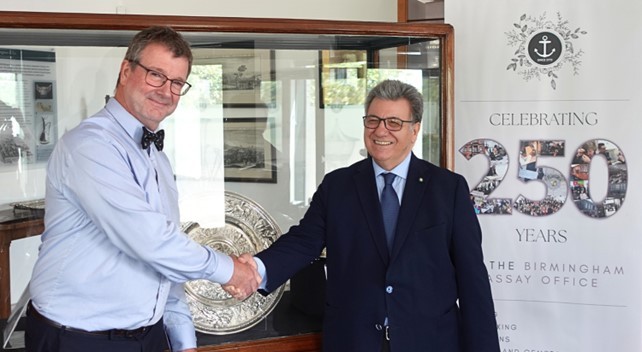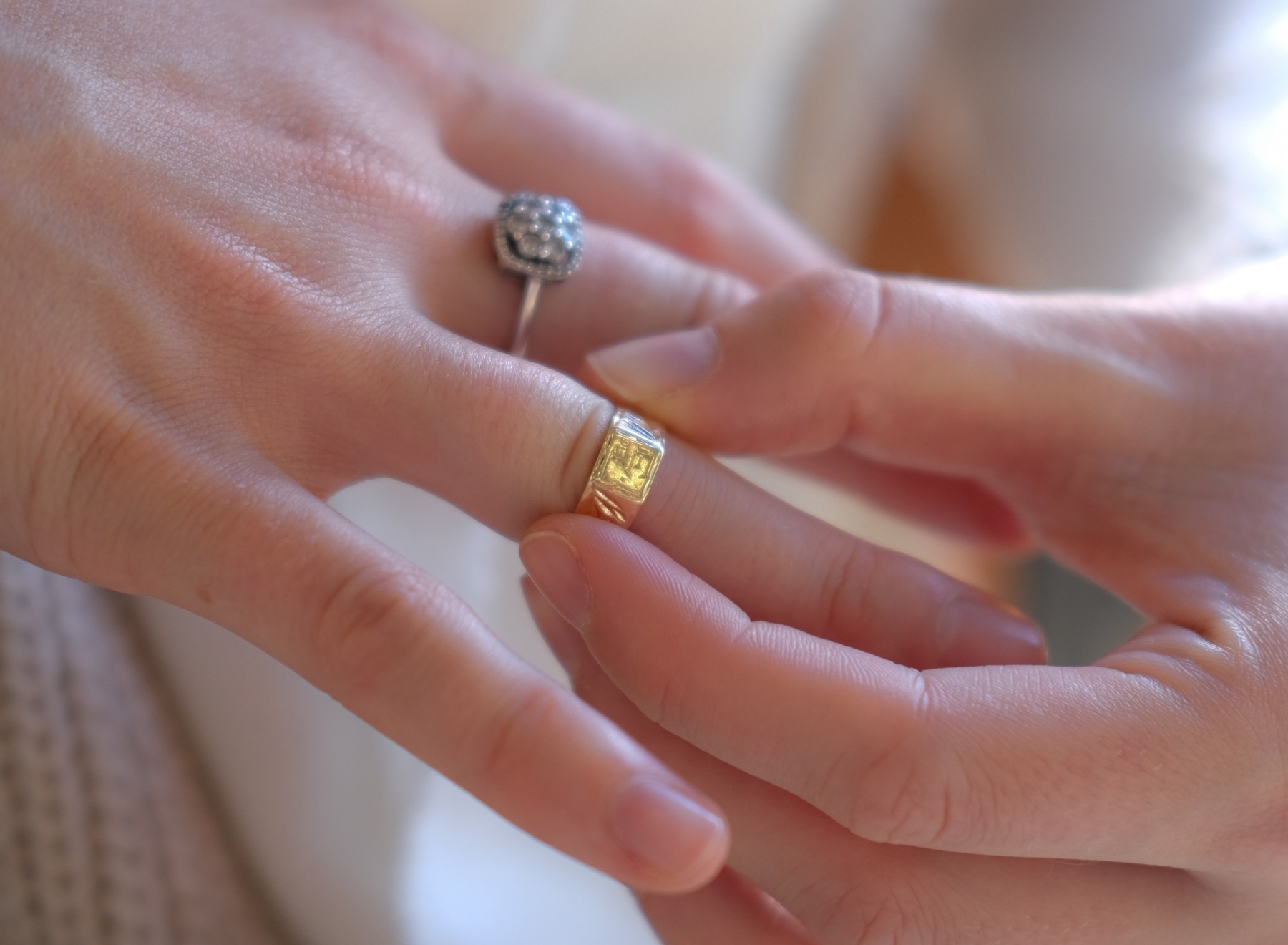In the late 19th and early 20th centuries, a beautiful range of silver inspired by the Arts and Crafts Movement was manufactured in Birmingham.  The famous London department store Liberty and Company went into partnership with the Birmingham silversmith William Haseler to produce the âCymricâ silver range from 1898 onwards. It was a great success, tapping into the middle-class demand for silver and metalware in the Arts and Crafts style, which had become extremely fashionable.
Inspired by the writings of the 19th century art critic John Ruskin and popularised by the designer and socialist William Morris, followers of the Arts and Crafts Movement aimed to re-introduce fine quality handcraftsmanship to late 19th and early 20th century decorative arts, believing that this would give craftspeople a sense of satisfaction and spiritual purpose in their work, as opposed to making mass-produced items by machine. However, handmade Arts and Crafts pieces were extremely expensive to buy, so Arthur Lazenby Liberty (1843-1917), who founded Liberty & Co, decided to introduce a range of more affordable silver into his store that utilised some machine production in its manufacture and Cymric was born. The new silver range fitted in perfectly with the luxurious Oriental textiles, ceramics and objects that were also on sale at Liberty & Co and that had helped make the store popular amongst English aesthetes such as Oscar Wilde and the Pre-Raphaelite painter Dante Gabriel Rossetti.
Arthur Lazenby Liberty also created a range of affordable pewter pieces called âTudricâ. Good examples of Cymric and Tudric are highly prized by collectors today.
This elegant silver Standing Cup, which is our Treasure of the the Week,  is hallmarked Liberty & Co and dates from 1901/2. Its medieval styling is typical of the Cymric style and the cup is one of the highlights of our Arts and Crafts Movement cabinet in our Matthew Boulton Silver room. We also have an original Cymric Catalogue in the Library at the Assay Office which features an illustration of this cup.
It is hard to say who designed pieces of Cymric silver. A network of freelance designers such as Archibald Knox, who was born on the Isle of Man, Jessie Marion King from Scotland and Bernard Cuzner from Birmingham, produced designs for some Cymric pieces, but it is very difficult to definitively identify pieces by particular designers because Liberty adopted a policy of anonymity when offering pieces for sale.
The famous London department store Liberty and Company went into partnership with the Birmingham silversmith William Haseler to produce the âCymricâ silver range from 1898 onwards. It was a great success, tapping into the middle-class demand for silver and metalware in the Arts and Crafts style, which had become extremely fashionable.
Inspired by the writings of the 19th century art critic John Ruskin and popularised by the designer and socialist William Morris, followers of the Arts and Crafts Movement aimed to re-introduce fine quality handcraftsmanship to late 19th and early 20th century decorative arts, believing that this would give craftspeople a sense of satisfaction and spiritual purpose in their work, as opposed to making mass-produced items by machine. However, handmade Arts and Crafts pieces were extremely expensive to buy, so Arthur Lazenby Liberty (1843-1917), who founded Liberty & Co, decided to introduce a range of more affordable silver into his store that utilised some machine production in its manufacture and Cymric was born. The new silver range fitted in perfectly with the luxurious Oriental textiles, ceramics and objects that were also on sale at Liberty & Co and that had helped make the store popular amongst English aesthetes such as Oscar Wilde and the Pre-Raphaelite painter Dante Gabriel Rossetti.
Arthur Lazenby Liberty also created a range of affordable pewter pieces called âTudricâ. Good examples of Cymric and Tudric are highly prized by collectors today.
This elegant silver Standing Cup, which is our Treasure of the the Week,  is hallmarked Liberty & Co and dates from 1901/2. Its medieval styling is typical of the Cymric style and the cup is one of the highlights of our Arts and Crafts Movement cabinet in our Matthew Boulton Silver room. We also have an original Cymric Catalogue in the Library at the Assay Office which features an illustration of this cup.
It is hard to say who designed pieces of Cymric silver. A network of freelance designers such as Archibald Knox, who was born on the Isle of Man, Jessie Marion King from Scotland and Bernard Cuzner from Birmingham, produced designs for some Cymric pieces, but it is very difficult to definitively identify pieces by particular designers because Liberty adopted a policy of anonymity when offering pieces for sale.
 The famous London department store Liberty and Company went into partnership with the Birmingham silversmith William Haseler to produce the âCymricâ silver range from 1898 onwards. It was a great success, tapping into the middle-class demand for silver and metalware in the Arts and Crafts style, which had become extremely fashionable.
Inspired by the writings of the 19th century art critic John Ruskin and popularised by the designer and socialist William Morris, followers of the Arts and Crafts Movement aimed to re-introduce fine quality handcraftsmanship to late 19th and early 20th century decorative arts, believing that this would give craftspeople a sense of satisfaction and spiritual purpose in their work, as opposed to making mass-produced items by machine. However, handmade Arts and Crafts pieces were extremely expensive to buy, so Arthur Lazenby Liberty (1843-1917), who founded Liberty & Co, decided to introduce a range of more affordable silver into his store that utilised some machine production in its manufacture and Cymric was born. The new silver range fitted in perfectly with the luxurious Oriental textiles, ceramics and objects that were also on sale at Liberty & Co and that had helped make the store popular amongst English aesthetes such as Oscar Wilde and the Pre-Raphaelite painter Dante Gabriel Rossetti.
Arthur Lazenby Liberty also created a range of affordable pewter pieces called âTudricâ. Good examples of Cymric and Tudric are highly prized by collectors today.
This elegant silver Standing Cup, which is our Treasure of the the Week,  is hallmarked Liberty & Co and dates from 1901/2. Its medieval styling is typical of the Cymric style and the cup is one of the highlights of our Arts and Crafts Movement cabinet in our Matthew Boulton Silver room. We also have an original Cymric Catalogue in the Library at the Assay Office which features an illustration of this cup.
It is hard to say who designed pieces of Cymric silver. A network of freelance designers such as Archibald Knox, who was born on the Isle of Man, Jessie Marion King from Scotland and Bernard Cuzner from Birmingham, produced designs for some Cymric pieces, but it is very difficult to definitively identify pieces by particular designers because Liberty adopted a policy of anonymity when offering pieces for sale.
The famous London department store Liberty and Company went into partnership with the Birmingham silversmith William Haseler to produce the âCymricâ silver range from 1898 onwards. It was a great success, tapping into the middle-class demand for silver and metalware in the Arts and Crafts style, which had become extremely fashionable.
Inspired by the writings of the 19th century art critic John Ruskin and popularised by the designer and socialist William Morris, followers of the Arts and Crafts Movement aimed to re-introduce fine quality handcraftsmanship to late 19th and early 20th century decorative arts, believing that this would give craftspeople a sense of satisfaction and spiritual purpose in their work, as opposed to making mass-produced items by machine. However, handmade Arts and Crafts pieces were extremely expensive to buy, so Arthur Lazenby Liberty (1843-1917), who founded Liberty & Co, decided to introduce a range of more affordable silver into his store that utilised some machine production in its manufacture and Cymric was born. The new silver range fitted in perfectly with the luxurious Oriental textiles, ceramics and objects that were also on sale at Liberty & Co and that had helped make the store popular amongst English aesthetes such as Oscar Wilde and the Pre-Raphaelite painter Dante Gabriel Rossetti.
Arthur Lazenby Liberty also created a range of affordable pewter pieces called âTudricâ. Good examples of Cymric and Tudric are highly prized by collectors today.
This elegant silver Standing Cup, which is our Treasure of the the Week,  is hallmarked Liberty & Co and dates from 1901/2. Its medieval styling is typical of the Cymric style and the cup is one of the highlights of our Arts and Crafts Movement cabinet in our Matthew Boulton Silver room. We also have an original Cymric Catalogue in the Library at the Assay Office which features an illustration of this cup.
It is hard to say who designed pieces of Cymric silver. A network of freelance designers such as Archibald Knox, who was born on the Isle of Man, Jessie Marion King from Scotland and Bernard Cuzner from Birmingham, produced designs for some Cymric pieces, but it is very difficult to definitively identify pieces by particular designers because Liberty adopted a policy of anonymity when offering pieces for sale.
Your item has been added to the basket
You need to create an account, or login before you can add this item to your basket.







